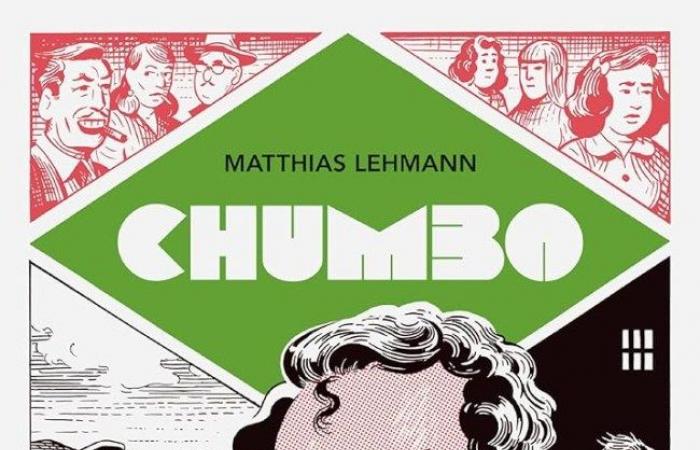Of all the literary releases that discuss the 60 years since the coup d’état that established the military dictatorship in Brazil, the most unusual and thought-provoking thing is “Lead” (Editora Nemo, 368 pages, R$ 119.80). It is a graphic novel written and drawn by the French-Brazilian author Matthias Lehmann which portrays a fundamental period in Brazilian history. From the mid-1930s to the 2000s, the voluminous work paints a breathtaking portrait.
The plot is centered on the Wallaces, freely inspired by the author’s relatives, and uses the family nucleus to address the ideological disagreements and political negotiations that defined the country’s direction. On the pages, Lehmann mixes elements of brazilian designin paintings famous and architecture and mentions historical characters truthful information to compose the work.
All of this shows that Lehmann’s gaze is not foreign. Son of a Brazilian mother and French father, he lived in Europe, but came here many times as a child. Now, with “Chumbo”, he dives deep into a fundamental period of history. Launched in France in 2023, the work was nominated for the Angouleme award, the most important in comics.
In the following interview, Lehmann talks about his inspirations, his working method and the parallels between the story he tells in the comic and the current moment of rise of the far right in Europe.
You have a connection with Brazil. Why did you decide to write about this period in history now?
My connection with Brazil is through my family. My mother is Brazilian and passed this culture on to me. But I grew up in France and like many people who have two nationalities, I felt that one wasn’t exactly my country. I wanted to build a more personal relationship with Brazil. With my weapons, in a way, and my weapon is writing comics.
What were your main sources of inspiration and information to build the story?
No comics. I don’t know if there is one that addresses the topic. It must exist, but I preferred not to look at what other comic artists did and go more fresh with the story. I read many books on the history of the dictatorship, the guerrillas, the military. About the history of Belo Horizonte. I read a great one by Humberto Werneck, “O Satino da Rapaziada”. I was inspired by him to create Severino, a journalist who wants to be a writer.
Continues after advertising
What about visual documentation?
I found a book by Chico Homem de Mello about Brazilian design that was published by Cosac Naify, which is very complete. I looked and got ideas. Brazilian design is very rich, and I wanted to appropriate it. I also looked on the internet. You can find a lot of things there, but you can’t look for them lazily. Otherwise, you end up finding the same references that everyone else uses.
What has the repercussion been like in Europe?
For now it has been published in France, later it will go to Portugal and Holland, in addition to Brazil. The reception was very good. For many French people, Brazil is all about joy, music, football, carnival and the beach. Of course this is all part of it, but it is much more. I wanted to talk about the most difficult, even darkest things. And here people even know that there was a dictatorship, that there was a coup d’état, but little else.
What are the possibilities that comics, as a means of telling stories, offer?
There are multiple. Because you have text, image, page composition, design, all these things come in. You can talk about painting, cinema, music. All of this worked with a rhythm. I’ts very interesting. You work with the rhythm to tell things with just images, you can suggest others, in a more intuitive way. He shows something, trusting that the reader will understand it and create the narration inside his head. It’s an experience.
What is your working method like?
I make small sketches and get an idea of the composition before drawing the final page. I want to tell the story with a certain rhythm, but I also want to be surprised. If I only make the pages always square, I’ll get tired. Every now and then I make a composition explode, I look for references in comics, design, architecture, to find motivation.
Continues after advertising
How long did it take to complete the work?
Four years. The final volume of the work was 360 pages long. So, I produced around 100 pages per year, including documentation, research, drawings and script. Worked hard. Is fast! (laughter)
Do you see a parallel between the current situation in Brazil and what is happening in France?
Yes. It’s very much a process of what’s happening now in France, with the rise of the far right and authoritarianism. I believe we will have an extreme right-wing government in the future. As in most European countries, in fact. It’s something general, a desire to seek security in these authority figures. And I believe that social networks are closely linked to this phenomenon. In Brazil, in a way, Bolsonaro authorized this thought at that moment when he voted to dismiss Dilma and dedicated the vote to Ustra. It was an important moment, which provoked a response from society. And that is terrifying.
How to reverse this movement? Valuing the memory of times like the dictatorship?
I don’t know if the memory is enough anymore. People have an opinion, and it is much more important than listening to science or studying history. For them, none of this matters. They want to defend this opinion and that’s it. “Chumbo” is a type of work that participates in a global movement of struggle.
Do you see this movement with optimism?
It’s hard to be optimistic, but if we don’t try to fight this, we won’t have anything left. We have to go forward and face it. Here, in France, we are very worried about what will happen. But seeing the situation in Brazil, even though things are complicated, I have hope. There are people trying hard to save democracy. It’s difficult, not everything is perfect. But I hope the situation doesn’t get too bad. Both in Brazil and France.







